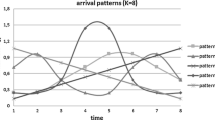Abstract
Purpose
Appointment scheduling systems traditionally book patients at fixed intervals, without taking into account the complexity factors of the health system. This paper analyzes several appointment scheduling policies of the literature and proposes the most suitable to a bariatric surgery clinic, considering the following complexity factors: (i) stochastic service times, (ii) patient unpunctuality, (iii) service interruptions, and (iv) patient no-shows.
Materials and Methods
We conducted the study using data collected in a bariatric surgery clinic located in Rio de Janeiro, Brazil. The dataset presented 1468 appointments from June 29, 2015, to June 29, 2016. We comparatively evaluate the main literature policies through a discrete event simulation (DES).
Results
The proposed policy (IICR) provides a 30% increase in attendance and allows a decrease in the total cost, maintaining the level of service in terms of average waiting time.
Conclusion
IICR was successfully implemented, and the practical results were very close to the simulated ones.


Similar content being viewed by others
References
Bhattacharjee P, Ray PK. Simulation modelling and analysis of appointment system performance for multiple classes of patients in a hospital: a case study. Oper Res Health Care. 2016;8:71–84.
Cayirli T, Veral E. Outpatient scheduling in health care: a review of literature. Prod Oper Manag. 2003;12(4):519–49.
Cayirli T, Yang KK, Quek SA. A Universal appointment rule in the presence of no-shows and walk-ins. Prod Oper Manag. 2012;21(4):682–97.
Gupta D, Denton B. Appointment scheduling in health care: challenges and opportunities. IIE Trans. 2008;40(9):800–19.
Salzarulo PA, Bretthauer KM, Côté MJ, et al. The impact of variability and patient information on health care system performance. Prod Oper Manag. 2011;20(6):848–59.
Klassen KJ, Yoogalingam R. Appointment system design with interruptions and physician lateness. Int J Oper Prod Manag. 2013;33(4):394–414.
Klassen KJ, Yoogalingam R. Strategies for appointment policy design with patient unpunctuality. Decis Sci. 2014;45(5):881–911.
Cayirli T, Veral E, Rosen H. Designing appointment scheduling systems for ambulatory care services. Health Care Manag Sci. 2006;9(1):47–58.
Klassen KJ, Yoogalingam R. Improving performance in outpatient appointment services with a simulation optimization approach. Prod Oper Manag. 2009;18(4):447–58.
LaGanga LR, Lawrence SR. Clinic overbooking to improve patient access and increase provider productivity*. Decis Sci. 2007;38(2):251–76.
Cayirli T, Yang KK. A Universal appointment rule with patient classification for service times, no-shows, and walk-ins. Serv Sci. 2014;6(4):274–95.
Spaniolas K, Kasten KR, Celio A, et al. Postoperative follow-up after bariatric surgery: effect on weight loss. Obes Surg. 2016;26(4):900–3.
Wheeler E, Prettyman A, Lenhard MJ, et al. Adherence to outpatient program postoperative appointments after bariatric surgery. Surg Obes Relat Dis. 2008;4(4):515–20.
Sockalingam S, Cassin S, Hawa R, et al. Predictors of post-bariatric surgery appointment attendance: the role of relationship style. Obes Surg. 2013;23(12):2026–32.
Toussi R, Fujioka K, Coleman KJ. Pre- and postsurgery behavioral compliance, patient health, and postbariatric surgical weight loss. Obesity (Silver Spring). 2009;17(5):996–1002.
Pontiroli AE, Fossati A, Vedani P, et al. Post-surgery adherence to scheduled visits and compliance, more than personality disorders, predict outcome of bariatric restrictive surgery in morbidly obese patients. Obes Surg. 2007;17(11):1492–7.
Dantas LF, Hamacher S, Cyrino Oliveira FL, et al. Predicting patient no-show behavior: a study in a bariatric clinic. Obes Surg. 2019;29(1):40–7.
Cayirli T, Veral E, Rosen H. Assessment of patient classification in appointment system design. Prod Oper Manag. 2008;17(3):338–53.
Dantas LF, Fleck JL, Cyrino Oliveira FL, et al. No-shows in appointment scheduling – a systematic literature review. Health Policy. 2018;122(4):412–21.
Ahmadi-Javid A, Jalali Z, Klassen KJ. Outpatient appointment systems in healthcare: a review of optimization studies. Eur J Oper Res. 2017;258(1):3–34.
Gómez-Ambrosi J, Salvador J, Páramo JA, et al. Involvement of leptin in the association between percentage of body fat and cardiovascular risk factors. Clin Biochem. 2002;35(4):315–20.
Catalán V, Gómez-Ambrosi J, Rodríguez A, et al. Expression of caveolin-1 in human adipose tissue is upregulated in obesity and obesity-associated type 2 diabetes mellitus and related to inflammation. Clin Endocrinol. 2008;68(2):213–9.
Gómez-Ambrosi J, Salvador J, Rotellar F, et al. Increased serum amyloid a concentrations in morbid obesity decrease after gastric bypass. Obes Surg. 2006;16(3):262–9.
Gallego-Escuredo JM, Gómez-Ambrosi J, Catalan V, et al. Opposite alterations in FGF21 and FGF19 levels and disturbed expression of the receptor machinery for endocrine FGFs in obese patients. Int J Obes. 2015;39(1):121–9.
Acknowledgments
The authors would like to thank all the clinic staff for their help with data collection.
Funding
This work was supported by the National Council for Scientific and Technological Development (CNPq) [grant numbers 306802/2015-5 and 403863/2016-3 to SH; 304843/2016-4 to FLCO; 311316/2018-2 to SDJB], Carlos Chagas Filho Foundation (FAPERJ) [grant number 202.673/2018 to FLCO], the Coordination for the Improvement of Higher Education Personnel (CAPES)—Finance Code 001, and the Pontifical Catholic University of Rio de Janeiro.
Author information
Authors and Affiliations
Corresponding author
Ethics declarations
Conflict of Interest
The authors declare that they have no conflict of interest.
Ethical Approval
This article does not contain any studies with human participants or animals performed by any of the authors. For this type of study, formal consent is not required.
Additional information
Publisher’s Note
Springer Nature remains neutral with regard to jurisdictional claims in published maps and institutional affiliations.
Rights and permissions
About this article
Cite this article
Peres, I.T., Hamacher, S., Cyrino Oliveira, F.L. et al. Simulation of Appointment Scheduling Policies: a Study in a Bariatric Clinic. OBES SURG 29, 2824–2830 (2019). https://doi.org/10.1007/s11695-019-03898-1
Published:
Issue Date:
DOI: https://doi.org/10.1007/s11695-019-03898-1




